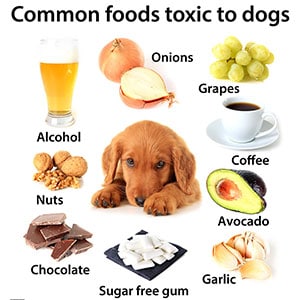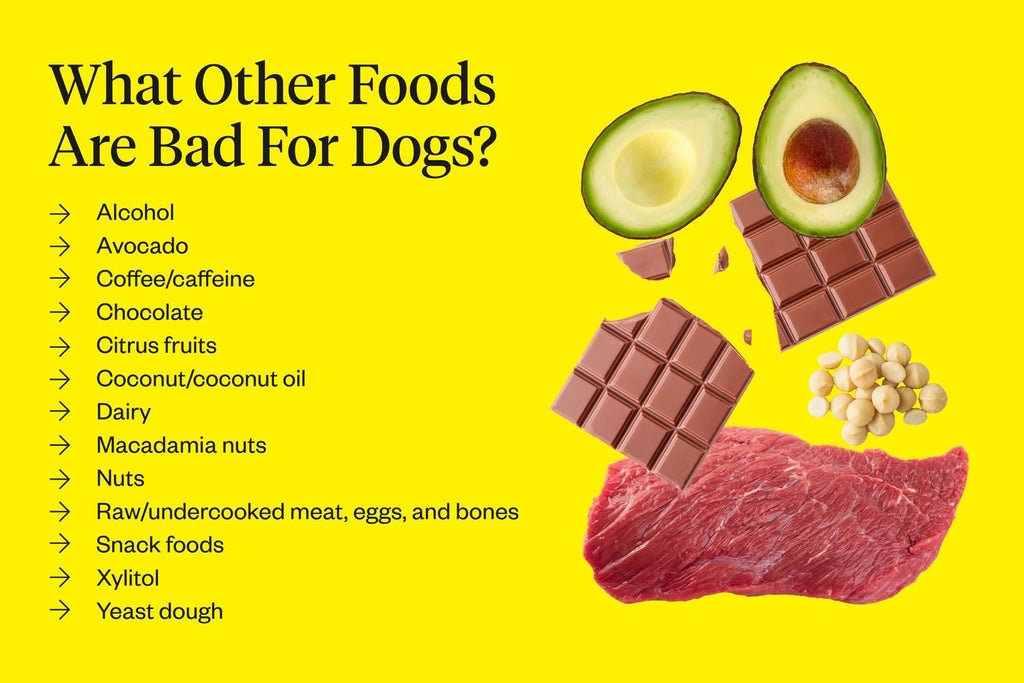When it comes to our furry friends, we always want to ensure their safety and wellbeing. But did you know that grapes can actually be harmful to beagles? While they may seem like a harmless snack to us, grapes and raisins can cause kidney failure in dogs, including beagles. This surprising fact highlights the importance of understanding what foods are safe for our pets and what foods should be avoided.
Grapes and raisins contain a toxin that can be toxic to dogs, particularly beagles. Even small amounts of grapes or raisins can cause severe health complications in dogs, such as kidney damage or failure. This is why it’s crucial for beagle owners to be aware of the potential dangers and to avoid feeding grapes or raisins to their furry friends. Instead, opt for dog-friendly snacks that are safe and nutritious for beagles, ensuring their overall health and well-being.
Grapes can be harmful to beagles. They contain compounds that can cause kidney failure and toxicity in dogs. Even a small amount of grapes can be dangerous. Symptoms may include vomiting, diarrhea, and lethargy. If you suspect your beagle has ingested grapes, it’s important to seek veterinary care immediately. To keep your beagle safe, avoid giving them grapes or any grape products.

The Dangers of Grapes for Beagles
Grapes are a delicious and nutritious fruit that many humans enjoy as a snack or part of a meal. However, when it comes to our furry friends, such as beagles, grapes can pose a serious health risk. In fact, grapes and raisins are toxic to beagles and can cause kidney failure. As a responsible dog owner, it’s important to be aware of the dangers of grapes and to keep them out of reach of your beagle. This article will explore why grapes are bad for beagles and provide information on how to keep your furry friend safe.
Toxicity in Beagles
Grapes and raisins contain a substance that is toxic to beagles, although the exact compound responsible for the toxicity is not yet known. What we do know is that even a small amount of grapes or raisins can lead to severe kidney damage in beagles. The symptoms of grape toxicity in beagles may include vomiting, diarrhea, increased thirst, decreased appetite, abdominal pain, and lethargy.
If you suspect that your beagle has ingested grapes or raisins, it is important to seek veterinary attention immediately. Prompt treatment can help prevent kidney failure and increase the chances of a full recovery. Your veterinarian may induce vomiting to remove the grapes from your beagle’s system or administer activated charcoal to prevent the absorption of the toxin. They may also provide supportive care, such as intravenous fluids and medications, to protect your beagle’s kidneys.
The Risks of Grapes for Beagles
While the exact mechanism of grape toxicity in beagles is still unclear, it is known that some dogs are more susceptible than others. Beagles, along with other small breeds, have been found to be particularly sensitive to the toxic effects of grapes. Even a small amount of grapes or raisins can cause kidney damage in beagles, and there is no safe threshold for consumption.
It’s also worth noting that the toxic effects of grapes can vary from dog to dog. Some beagles may show severe symptoms after eating just a few grapes, while others may not show any symptoms at all. Therefore, it is important to be cautious and avoid feeding grapes to your beagle under any circumstances.
Preventing Grape Ingestion
To keep your beagle safe, it is essential to prevent them from ingesting grapes or raisins. Here are some steps you can take to minimize the risk:
- Keep grapes and raisins out of reach of your beagle by storing them in a secure place, such as a high cabinet or refrigerator.
- Avoid leaving grapes or raisins unattended on countertops or tables where your beagle can accidentally reach them.
- Be cautious when disposing of grape stems or other grape-related waste, as beagles may try to scavenge from the trash.
- Educate your family members and guests about the dangers of grapes and raisins for beagles to ensure everyone is on board with keeping them away from your furry friend.
If you suspect that your beagle has ingested grapes or raisins, even in small amounts, contact your veterinarian immediately. It’s always better to be safe than sorry when it comes to your pet’s health.
Safe Alternatives for Beagles
Now that you know the dangers of grapes for beagles, you may be wondering what fruits are safe and healthy alternatives. Fortunately, there are plenty of options that beagles can enjoy without any risks:
- Apples: Remove the seeds and core, then slice or dice the apples into small, bite-sized pieces.
- Blueberries: These small, nutrient-packed berries are a great option for beagles.
- Strawberries: Rich in vitamins and antioxidants, strawberries make a delicious and safe treat for beagles.
- Watermelon: Remove the seeds and rind, then offer your beagle small pieces of juicy watermelon.
Remember to always introduce new foods to your beagle in moderation and monitor for any adverse reactions. If you’re unsure about the safety of a particular fruit or vegetable, consult with your veterinarian before offering it to your beagle.
Conclusion
Grapes are bad for beagles and can cause severe kidney damage. It’s essential to keep grapes and raisins out of reach of your beagle to prevent accidental ingestion. If you suspect that your beagle has eaten grapes or raisins, seek veterinary attention immediately. Remember, there are plenty of safe alternatives for your beagle to enjoy, such as apples, blueberries, strawberries, and watermelon. Prioritize your beagle’s health and well-being by avoiding grapes and offering them safe and healthy treats.
Key Takeaways: Are Grapes Bad for Beagles?
- Grapes can be toxic to beagles and other dogs, causing kidney damage.
- It is best to avoid feeding grapes, raisins, and grape products to your beagle.
- Even a small amount of grapes can be harmful to your beagle’s health.
- If your beagle accidentally ingests grapes, seek immediate veterinary attention.
- Prevention is key – keep grapes and grape-containing foods out of reach of your beagle.
Frequently Asked Questions
Grapes are a popular fruit enjoyed by many, but when it comes to our furry friends, like beagles, we need to be cautious. There is conflicting information about whether grapes are safe for dogs, so it’s important to understand the potential risks. This FAQ will help answer common questions about grapes and their impact on beagles’ health.
1. Can beagles eat grapes?
It is not recommended to feed grapes to beagles or any dog breed. Grapes, and even raisins, can be toxic and potentially dangerous for dogs. The exact compound in grapes that causes toxicity is still unknown, but it can lead to kidney failure in some dogs. To keep your beagle safe, it’s best to avoid feeding them grapes altogether.
If your beagle accidentally ingests grapes or shows any symptoms like vomiting, diarrhea, loss of appetite, or lethargy after consuming grapes, it is essential to seek veterinary help immediately. Prompt treatment can help minimize any potential harm caused by grapes.
2. What are the symptoms of grape toxicity in beagles?
Grape toxicity can vary from dog to dog, but some common symptoms may include vomiting, diarrhea, loss of appetite, abdominal pain, weakness, and increased thirst. In more severe cases, it can lead to kidney failure, which may present as decreased urine production or difficulty urinating. If you suspect grape toxicity in your beagle, it’s crucial to seek immediate veterinary care for proper diagnosis and treatment.
Note that not all dogs will show symptoms after ingesting grapes, and some may be more susceptible than others. It’s essential to take any ingestion of grapes seriously and consult with a veterinarian, even if your beagle appears to be fine.
3. Are there any safe alternatives to grapes for beagles?
Absolutely! There are plenty of safe and healthy alternatives to grapes that you can offer to your beagle. Fruits such as apples, bananas, blueberries, and strawberries can be great options for a tasty and nutritious treat. However, always remember to remove any seeds, stems, or pits that may be harmful to your beagle.
It’s also important to moderate the amount of fruit you give to your beagle as too much can cause digestive upset. As with any new food you introduce, start with small portions and monitor your beagle for any adverse reactions.
4. Can other breeds of dogs eat grapes?
The toxicity of grapes can affect dogs of various breeds, not just beagles. It’s important to note that there is no safe breed when it comes to grapes. The potential risks of grape consumption can be the same for all dogs, regardless of their breed or size. Therefore, it’s best to avoid feeding grapes to any dog to prevent any possible complications.
Always keep in mind that not all dogs will react the same way to grape ingestion. While some may show immediate symptoms, others may not display any signs at all. However, it’s better to err on the side of caution and prioritize your dog’s safety by refraining from giving them grapes.
5. What should I do if my beagle accidentally eats grapes?
If you discover that your beagle has consumed grapes or raisins accidentally, it’s crucial to act quickly. Contact your veterinarian immediately and provide them with all the necessary information, including the approximate amount and time of ingestion. Your veterinarian may recommend inducing vomiting or other appropriate measures based on the situation.
Remember, time is of the essence, so seek veterinary advice promptly. Early intervention can greatly increase the chances of preventing any potential complications associated with grape ingestion in your beagle.

Are grapes and raisins poisonous for dogs? Dr. Dan talks symptoms and treatment for grape toxicity.
In summary, grapes can be harmful to beagles and should be avoided. They contain a toxic substance that can cause kidney failure in dogs.
If your beagle accidentally consumes grapes, it’s essential to seek immediate veterinary care. Preventing access to grapes and educating yourself on foods that are safe for your beagle can help keep them healthy and happy.
